Results
-
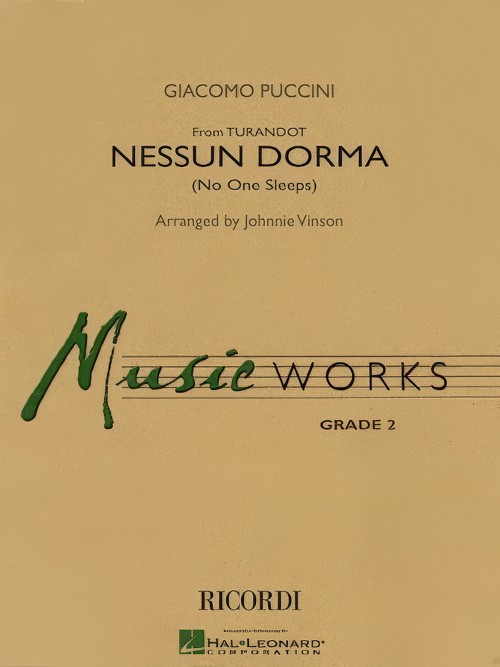 £54.99
£54.99Nessun Dorma (No One Sleeps) (Concert Band - Score and Parts) - Puccini, Giacomo - Vinson, Johnnie
There may not be a more beautiful melody in all of classic literature than this masterpiece by Puccini. This wonderful adaptation for young players gives all sections of the band a chance to play the melody at some point. What better way to teach a lyric style of playing than with this well-paced and rich-sounding arrangement. Duration: 2:30
Estimated dispatch 7-14 working days
-
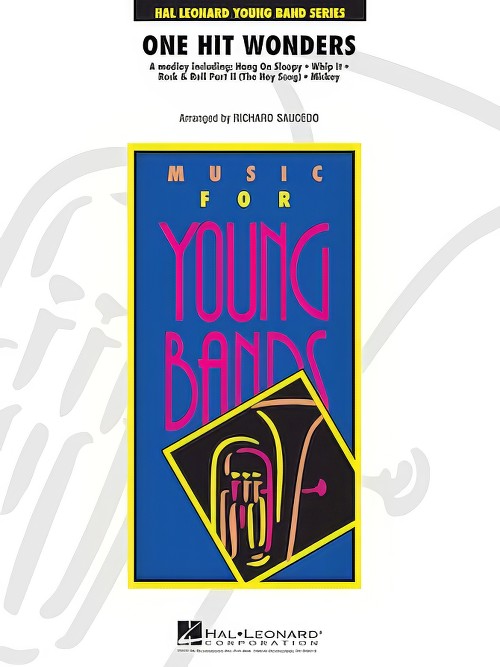 £69.99
£69.99One Hit Wonders (Concert Band - Score and Parts) - Saucedo, Richard L.
Over the years, many pop groups come and go. Some are forgotten more quickly than others, however their music continues to lives on. Here is an entertaining collection of well-known hits by their lesser-known creators. Includes: Rock & Roll Part 2 (The Hey Song) (Gary Glitter), Mickey (Toni Basil), Rock On (David Essex), Whip It (Devo) and Hang On Sloopy (The McCoys). This would make a fun music trivia test for the audience!
Estimated dispatch 7-14 working days
-
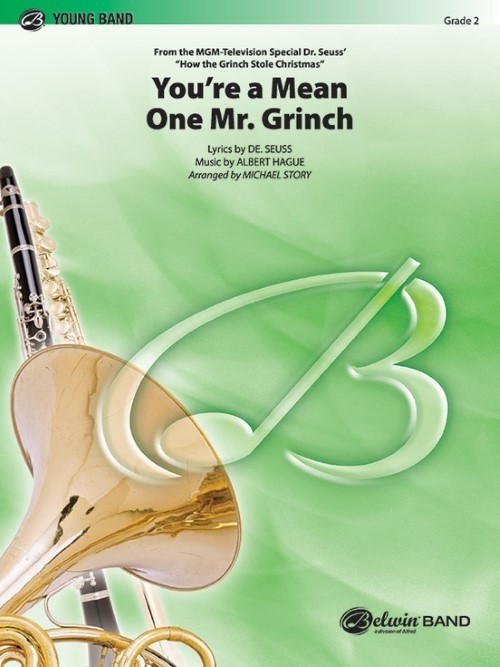 £60.50
£60.50You're a Mean One, Mr. Grinch (Concert Band - Score and Parts) - Hague & Seuss - Story, Michael
A mean old Grinch who steals Christmas? Who ever heard of such a thing? From the delightful television program that lights up our television screen (and our holidays) every year comes this nasty villian's theme song. It's a quick-rehearsing and easy-to-play piece that will be immediately recognised by your holiday concert audience. Duration: 1.45
Estimated dispatch 7-14 working days
-
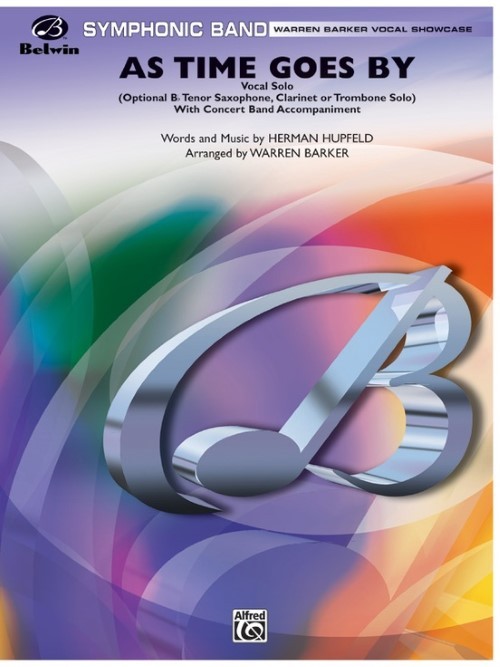 £84.50
£84.50As Time Goes By (Vocal or Instrumental Solo with Concert Band - Score and Parts) - Hupfeld, Herman - Barker, Warren
It seems that every community or school has at least one vocal soloist just ready, willing and able to perform with your concert band. To fill the need for audience-pleasing 'pop' standards, Warren Barker recently launched his Vocal Showcase Series and contributes this delightful new scoring to that series. Should you wish to use an instrumental soloist, parts are included for solo tenor saxophone, clarinet or trombone. Wonderfully lush 'Barker' treatment.Vocal range: A-flat below staff to fourth line D, treble clefDuration 3:30
Estimated dispatch 7-14 working days
-
 £71.28
£71.28One With The Wind
The breathtaking exhilaration experienced by those who love to run is the foundation for this magnificent original composition for more advanced bands. Shimmering woodwind and mallet passages alternate with powerful brass statements to create a stunning soundscape that will be a highlight of any concert or festival performance. Rapidly changing styles ranging from chorales to dances will provide a number of worthwhile challenges to your ensemble. Pure joy!
Estimated dispatch 7-14 working days
-
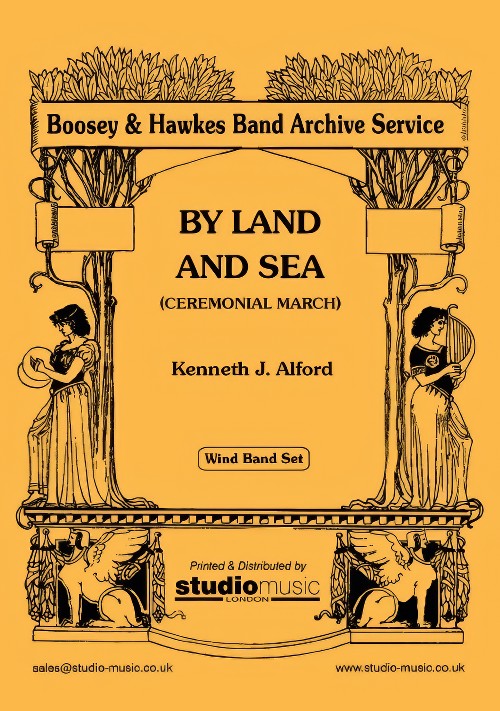 £24.95
£24.95By Land and Sea (Concert Band Marchcard Set) - Alford, Kenneth J.
Ceremonial March dedicated to the Royal Marines, Plymouth Division. Each standard set will consist of 2 Solo Clarinet; 2 1st Cornet; 2 Basses and one each of all other parts, including Conductor (if applicable), originally included in the printed set.
Estimated dispatch 7-14 working days
-
£264.99
Diferencias on an Old Spanish Song - Yasuhide Ito
I am immensely happy that my Gloriosa, symphonic poem for band (1990), has been performed by so many bands in the last thirty years.During this period, the growth of the internet has made it much easier to access information.When I composed Gloriosa, I only had limited information about the period when Christianity and Western music was first introduced to Japan, and had to rely a lot on my imagination.However, nowadays, it is easy to obtain various source materials and to read interesting studies on the music of the past.In recent years, the music of Luis de Narvez (born ca.1500 - died between 1555-1560), Spanish composer and vihuela player, has become increasingly known, and several CDs of his music are now available.Narvez composed the earliest-known set of diferencias, a forerunner of the variation form. One of his works is Seys diferencias sobre el himno "O gloriosa domina" [Six diferencias on the hymn "O gloriosa domina"] (1538), based on the Spanish Marian hymn, and it was this melody I used in the first movement of my Gloriosa.Western music has been my musical roots since childhood, and throughout my career as a composer, it has continued to fascinate me. One could say that this has provided the inspiration for Diferencias on an Old Spanish Song, my own take on the diferencias form.Actually, such music from the early sixteenth century could sound fresh to our modern ears. So I decided to quote the melody from Narvez's Sey diferencias at the beginning and end of the piece, in order that people can get the feel for the period.The main section (bars 42-390) is formed of 13 diferencias, similar to the first movement of the Gloriosa.In the middle section, which begins after the eighth diferencia(from bar 187), one should be totally absorbed in the tranquility and the beauty of the music. Although it's in the style of a sarabande, it should be taken slower and played as pianissimo as possible.This is followed by folk-style dance music. (As only standard percussion instruments are used, try to be creative with tonal colours and sense of rhythm).The structure of the work is simple, but be aware of the connection between the sections when constructing the whole.Also, think about the tonality. Overall, the work is in F minor. The main section is basically in D minor, but from bar 102, it modulates to A flat minor and G minor, and then in the middle section it suddenly switches to A flat major (which is the furthest key from D minor, and the relative major of F minor). From bar 219, it modulates to F minor and then to C minor, then back to F minor by way of A minor.N.B. The Oboe II part can be substituted by the English Horn (as indicated in the parts). One can choose according to the player's skills or preference.Recent new compositions for wind band are often full of rhythm, dynamism, and tonal colour, and compositional techniques and orchestration have also evolved greatly. Yet on the other hand, they tend to feature fewer melodic or expressive elements. Since this work is the test piece for WMC Kerkrade 2022, I had to think about what "tests" or "challenges" to set, and I decided to compose something that doesn't involve a lot of technical display, but requires beautiful sounds and harmonies, and above all, musical expressivity. I didn't put many expression markings in the score, because I wanted the performers to think about how best to express this music. If it is played merely as notated, it's not going to sound very interesting.Christianity was introduced to Japan in the mid-16th century, but it was subsequently banned and Japan entered a period of national isolation, which meant that there was hardly any international exchange for two hundred years. As a result, the Christian hymns that were introduced prior to the isolation became almost unrecognizable over the centuries. This was the theme I explored in my Gloriosa thirty years ago.Now, in 2021, the whole world has been forced to "isolate" due to the Covid-19 pandemic. In such times, it seems pertinent that I've written a work using this melody again. I sincerely hope that people will be able to gather in Kerkrade in 2022.(English Translation:Nahoko Gotoh)
Estimated dispatch 7-14 working days
-
£248.99
Odysseia - Maxime Aulio
Washed up on the Phaeacian shore after a shipwreck, Odysseus is introduced to King Alcinous. As he sits in the palace, he tells the Phaeacians of his wanderings since leaving Troy. Odysseus and his men fi rst landed on the island of the Cicones wherethey sacked the city of Ismarus. From there, great storms swept them to the land of the hospitable Lotus Eaters. Then they sailed to the land of the Cyclopes. Odysseus and twelve of his men entered the cave of Polyphemus. After the single-eyed giantmade handfuls of his men into meals, Odysseus fi nally defeated him. He got him drunk and once he had fallen asleep, he and his men stabbed a glowing spike into the Cyclop's single eye, completely blinding him. They escaped by clinging to the belliesof some sheep. Once aboard, Odysseus taunted the Cyclop by revealing him his true identity. Enraged, Polyphemus hurled rocks at the ship, trying to sink it. After leaving the Cyclopes' island, they arrived at the home of Aeolus, ruler of the winds.Aeolus off ered Odysseus a bag trapping all the strong winds within except one - the one which would take him straight back to Ithaca. As the ship came within sight of Ithaca, the crewmen, curious about the bag, decided to open it. The winds escapedand stirred up a storm. Odysseus and his crew came to the land of the cannibalistic Laestrygonians, who sank all but one of the ships. The survivors went next to Aeaea, the island of the witch-goddess Circe. Odysseus sent out a scouting party butCirce turned them into pigs. With the help of an antidote the god Hermes had given him, Odysseus managed to overpower the goddess and forced her to change his men back to human form. When it was time for Odysseus to leave, Circe told him to sail tothe realm of the dead to speak with the spirit of the seer Tiresias. One day's sailing took them to the land of the Cimmerians. There, he performed sacrifi ces to attract the souls of the dead. Tiresias told him what would happen to him next. He thengot to talk with his mother, Anticleia, and met the spirits of Agamemnon, Achilles, Patroclus, Antilochus, Ajax and others. He then saw the souls of the damned Tityos, Tantalus, and Sisyphus. Odysseus soon found himself mobbed by souls. He becamefrightened, ran back to his ship, and sailed away. While back at Aeaea, Circe told him about the dangers he would have to face on his way back home. She advised him to avoid hearing the song of the Sirens; but if he really felt he had to hear, thenhe should be tied to the mast of the ship, which he did. Odysseus then successfully steered his crew past Charybdis (a violent whirlpool) and Scylla (a multiple-headed monster), but Scylla managed to devour six of his men. Finally, Odysseus and hissurviving crew approached the island where the Sun god kept sacred cattle. Odysseus wanted to sail past, but the crewmen persuaded him to let them rest there. Odysseus passed Circe's counsel on to his men. Once he had fallen asleep, his men impiouslykilled and ate some of the cattle. When the Sun god found out, he asked Zeus to punish them. Shortly after they set sail from the island, Zeus destroyed the ship and all the men died except for Odysseus. After ten days, Odysseus was washed up on theisland of the nymph Calypso.
Estimated dispatch 7-14 working days
-
 £248.99
£248.99Odysseia (Concert Band - Score and Parts) - Aulio, Maxime
Washed up on the Phaeacian shore after a shipwreck, Odysseus is introduced to King Alcinous. As he sits in the palace, he tells the Phaeacians of his wanderings since leaving Troy. Odysseus and his men fi rst landed on the island of the Cicones where they sacked the city of Ismarus. From there, great storms swept them to the land of the hospitable Lotus Eaters. Then they sailed to the land of the Cyclopes. Odysseus and twelve of his men entered the cave of Polyphemus. After the single-eyed giant made handfuls of his men into meals, Odysseus fi nally defeated him. He got him drunk and once he had fallen asleep, he and his men stabbed a glowing spike into the Cyclop's single eye, completely blinding him. They escaped by clinging to the bellies of some sheep. Once aboard, Odysseus taunted the Cyclop by revealing him his true identity. Enraged, Polyphemus hurled rocks at the ship, trying to sink it. After leaving the Cyclopes' island, they arrived at the home of Aeolus, ruler of the winds. Aeolus off ered Odysseus a bag trapping all the strong winds within except one - the one which would take him straight back to Ithaca. As the ship came within sight of Ithaca, the crewmen, curious about the bag, decided to open it. The winds escaped and stirred up a storm. Odysseus and his crew came to the land of the cannibalistic Laestrygonians, who sank all but one of the ships. The survivors went next to Aeaea, the island of the witch-goddess Circe. Odysseus sent out a scouting party but Circe turned them into pigs. With the help of an antidote the god Hermes had given him, Odysseus managed to overpower the goddess and forced her to change his men back to human form. When it was time for Odysseus to leave, Circe told him to sail to the realm of the dead to speak with the spirit of the seer Tiresias. One day's sailing took them to the land of the Cimmerians. There, he performed sacrifi ces to attract the souls of the dead. Tiresias told him what would happen to him next. He then got to talk with his mother, Anticleia, and met the spirits of Agamemnon, Achilles, Patroclus, Antilochus, Ajax and others. He then saw the souls of the damned Tityos, Tantalus, and Sisyphus. Odysseus soon found himself mobbed by souls. He became frightened, ran back to his ship, and sailed away. While back at Aeaea, Circe told him about the dangers he would have to face on his way back home. She advised him to avoid hearing the song of the Sirens; but if he really felt he had to hear, then he should be tied to the mast of the ship, which he did. Odysseus then successfully steered his crew past Charybdis (a violent whirlpool) and Scylla (a multiple-headed monster), but Scylla managed to devour six of his men. Finally, Odysseus and his surviving crew approached the island where the Sun god kept sacred cattle. Odysseus wanted to sail past, but the crewmen persuaded him to let them rest there. Odysseus passed Circe's counsel on to his men. Once he had fallen asleep, his men impiously killed and ate some of the cattle. When the Sun god found out, he asked Zeus to punish them. Shortly after they set sail from the island, Zeus destroyed the ship and all the men died except for Odysseus. After ten days, Odysseus was washed up on the island of the nymph Calypso.
Estimated dispatch 7-14 working days
-
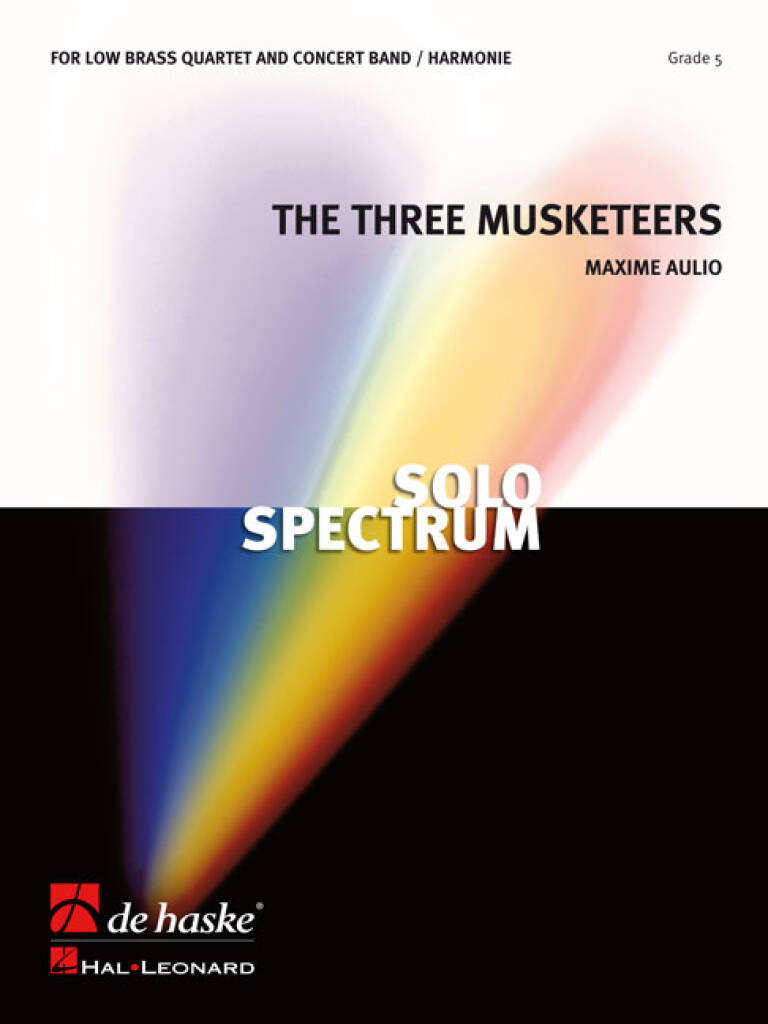 £239.99
£239.99The Three Musketeers, Op. 8 - Maxime Aulio
Les Trois Mousquetaires (The Three Musketeers) was commissioned by the Miraphone company for the Miraphone Tuba Quartett and the Musique des Gardiens de la Paix (Paris, France). It was premired in Guebwiller (France), on 28 June 2003 by its dedicatees.Even if you have never read a line of the mythical novel The Three Musketeers (1844) by Alexandre Dumas, father, you will at least have heard of the "four invincibles"; four extraordinary names - D'Artagnan, Athos, Porthos, and Aramis - and one unique motto "All for one, and one for all." The musical texture of Les Trois Mousquetaires is focused on specific elements of a character's personality rather thanon its influence on the book's plot. Maxime Aulio has largely turned his attention on D'Artagnan, the sensitive, romantic and perfect gentleman who is easily charmed by women such as the gentle Constance Bonacieux and the perfidious Milady de Winter whose beguiling beauty seduced him. The first movement - D'Artagnan - is true to the character of the young provincial noble of the Gascony region: heroic and enthusiastic in all circumstances. The second movement entitled Constance Bonacieux, is romantic, delicate and passionate. The third and last movement is as duplicitous as the bewitching femme fatale its reveals: Milady de Winter.
Estimated dispatch 7-14 working days
